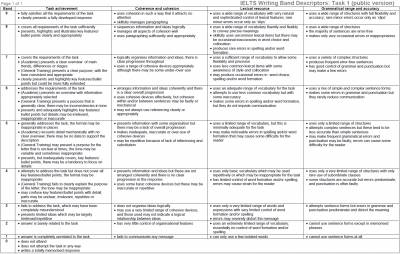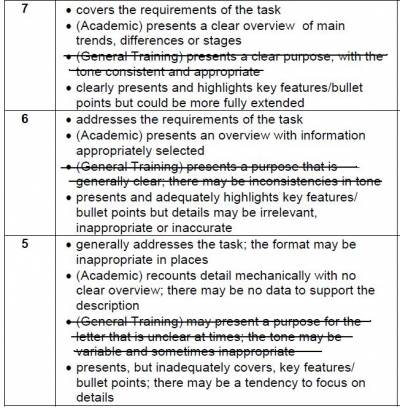IELTS
| Сдать международные экзамены по английскому языку можно здесь:http://www.ielts-moscow.ru/bibgr1.html 115054, Россия, г.Москва, ул. Щипок, 20, офис 304 Тел.: (495) 956 1923 E-mail: ielts@studinter.ru |
 |
Материал из Википедии — свободной энциклопедии
IELTS (англ. International English Language Testing System) — международная система тестирования по английскому языку для определения навыков владения теми, кто собирается эмигрировать, обучаться или проходить практику в англоязычной среде, и позволяет определить уровень владения английским языком у людей, для которых английский не является родным.
Управляющими IELTS являются Cambridge ESOL, Британский совет и IDP:IELTS Australia.
Тест IELTS может понадобиться тем, кто планирует подавать документы на иммиграцию в Великобританию, Канаду, Австралию, Новую Зеландию, поступать на учёбу в канадские, австралийские, новозеландские, американские, британские или ирландские университеты. Количество учебных заведений в мире, признающих результаты экзамена IELTS, постоянно увеличивается.
Методика
Существует два вида теста, Academic (предназначенный для людей, желающих получить высшее образование в учебных заведениях, где обучение ведётся на английском языке) и General Training (предназначенный для людей, планирующих иммиграцию в вышеперечисленные англоязычные страны).
Особенностью Academic теста является повышенный уровень сложности теста на чтение (Reading section) и письмо (Writing section) по сравнению с теми же тестами в General Training.
По рекомендации IELTS результат теста действителен в течение двух лет с момента получения.
IELTS состоит из 4 разделов, которые сдаются в следующем порядке: Listening, Reading, Writing, Speaking.
§ Listening — длится 40 минут, из которых 30 — непосредственно аудирование плюс 10 минут на перенос ответов в бланк
§ диалоги на бытовую тему
§ монологи на заданную тему
§ Reading — ровно час (необходимо ответить на вопросы по текстам (обычно их 3))
§ Writing — ровно час
§ Task One. Академический: Описать в 150 словах диаграмму либо таблицу. Общий: Написать письмо
§ Task Two. Эссе на 250 слов, тема даётся в задании
§ Speaking — от 11 до 14 минут. В этом модуле кандидат проходит интервью с экзаменатором один на один. На случай апелляции интервью записывается.
Шкала оценок изменяется от 0 («не пытался пройти тест») до 9 («пользователь — эксперт»).
Структура теста
Все кандидаты должны завершить 4 раздела — Listening, Reading, Writing и Speaking. Разделы Listening и Speaking для всех одинаковые, тогда как Reading и Writing отличаются в зависимости от того, какая версия теста выбрана — Academic или General.
Общая продолжительность теста для разделов Listening, Reading и Writing составляет около 2 часов 45 минут. Эти три модуля всегда проходят именно в таком порядке, и без перерывов. Раздел Speaking может проходить отдельно, в зависимости от тестового центра, с интервалом в 7 дней до или после остальных модулей.
§ Listening 40 мин. Первые 30 минут из них централизованно проигрывается запись, оставшиеся 10 минут кандидаты записывают ответы в опросный лист.
§ Reading 60 мин
§ Writing 60 мин
Оценочная шкала
Результаты IELTS оцениваются по 9 балльной шкале, охватывающей возможные уровни владения английским языком. Оценка может округляться до половины балла.
9 Пользователь — эксперт
Полностью владеет языком: адекватно, чётко и бегло с полным пониманием.
8 Очень хороший пользователь
Полностью владеет языком, за исключением отдельных неточностей. В отдельных нехарактерных ситуациях может проявить непонимание. Способен детально аргументировать свою позицию.
7 Хороший пользователь
Хорошо владеет языком, несмотря на некоторые неточности и непонимание. В целом демонстрирует хорошее знание языка и ясное детальное понимание.
6 Компетентный пользователь
В целом хорошо владеет языком, несмотря на некоторые неточности. Относительно хорошо владеет языком, в частности, в стандартных ситуациях.
5 Умеренный пользователь
Ограниченно владеет языком, в целом демонстрирует понимание большинства ситуаций, хотя и делает много ошибок. Способен на базовое общение.
4 Ограниченный пользователь
Базовое знание языка ограничено стандартными ситуациями. Часто испытывает проблемы со сложными языковыми конструкциями.
3 Чрезвычайно ограниченный пользователь
Демонстрирует только примерное понимание очень стандартных ситуаций.
2 Пользователь с перебоями
В реальности общение невозможно, кроме самых стандартных ситуаций с использованием отдельных слов и коротких формулировок.
1 Не владеющий языком
В целом не способен использовать язык за исключением нескольких отдельных слов.
0 Не пытался пройти тест
Не предоставлено никакой информации для оценки.
Таблица преобразования
Данная таблица может быть использована для преобразования баллов в разделах Listening и Reading в итоговую оценку. Носит только примерный характер, так как в конкретных случаях оценка может зависеть от сложности экзамена.
| Оценка | 9.0 | 8.5 | 8.0 | 7.5 | 7.0 | 6.5 |
| Правильные ответы | 39 — 40 | 37 — 38 | 35 — 36 | 32 — 34 | 29 — 31 | 26 — 28 |
| Оценка | 6.0 | 5.5 | 5.0 | 4.5 | 4.0 | 3.5 |
| Правильные ответы | 22 — 25 | 18 — 21 | 15 — 17 | 12 — 14 | 10 — 11 | 8 — 10 |
| Оценка | 3.0 | 2.5 | 2.0 | 1.5 | 1.0 | 0.0 |
| Правильные ответы | 6 — 7 | 4 — 5 | 3 | 2 | 1 | 0 |
IELTS Writing: Task 1 Assessment criteria and its implications for teaching
https://teflreflections.wordpress.com/2014/10/21/ielts-writing-task-1-assessment-criteria-and-its-implications-for-teaching/
I often get students who need to, for example, improve from 5.5 to 6.5 in writing, but only have a week or two before their exam. At first it sounds a bit like mission impossible, because in such a short time there is very little we can do to improve students grammar and vocabulary. Fortunately for our students, IELTS is not just about correct and varied language.
In this post I’d like to discuss the IELTS Writing Task 1 assessment criteria and its implications for preparing students for the exam. We’ll identify the most common mistakes students make that stop them from getting the desired band, which can at the same time be very easily fixed in a relatively short time. I’ll focus on Task 1 here, because for most students it is something completely new, and can turn out to be quite challenging.
Let’s get started then. Below you can see the assessment criteria (public version – the one we get as examiners is slightly, but not very, different, and is super top-secret, so I can’t share it here). You can easily download the public assessment criteria in pdf from for example the official IELTS site. You can click on the image below to enlarge it.
As you can see, there are four criteria, each of which is marked completely independently. That means you could (in theory) get a 9 in LR (Lexical Resource), but only 5 on TA (Task Achievement). The final score for the task is an average of all four criteria. The score is rounded down. This means that TA: 6, CC: 6, LR: 6 and GRA: 7 would give you a 6, while TA: 6, CC: 6, LR: 6 and GRA: 5 would give you 5.5. Of course, TA: 6, CC: 6, LR: 7 and GRA: 7 would add up to 6.5.
It is important to know which band your student needs as this will determine the areas you should focus on in the classes. In most cases (e.g. for visa or study reasons), students need a 6.5. As a result, we’ll focus our attention on the descriptors for band 5, 6 and 7.
In this post, I’ll look at TA first, because:
- students usually don’t know how to approach the task
- the most common mistakes are very easy to fix
- even students whose language is very good, often get low scores on TA
- it’s relatively easy to bring a student up from 5 to 7 in a short time
I crossed out points which refer to IELTS General Training Assessment as we will only focus on the Academic IELTS, which is the format 90% of candidates choose.
When you look at the criteria, decide:
- which two points stop you from getting band 6?
- what is an overview and why is it important?
- what could be classified as irrelevant, inaccurate and inappropriate details?
- how is band 7 specifically better than band 6?
Suggested answers:
- No data (i.e. no numbers) in the description and/or no overview. The student also focuses too much on detail.
- An overview presents the main or general trends that can be seen in the graph, e.g.Overall, the sales of desktop computers declined significantly during the period. Without an overview, the student will not get band 6
- Inappropriate: any evaluation or personal comments on the data. Irrelevant: data that is not presented, comments which do not relate to the graph. Inaccurate:factual mistakes in the description (e.g. with dates or numbers)
- The overview is clear and there are no inaccurate or inappropriate information as described above in point 3.
How should this inform our teaching?
As an examiner I sometimes want to cry when I get a Task 1 which in terms of CC, LR and/or GRA could be easily 7, but the student didn’t include any data. Or there’s no overview. Or the student interprets the data. It’s such a shame, because all these mistakes limit the work to 5 on TA. They’re also very easy to fix. In one of the next posts I’ll show you an example lesson which does exactly that.
Another important point we need to highlight to our students is that they should not focus on all the details. For example, describing what exactly happened in every single year in the graph or chart is not a good idea. Instead, the student should notice the main features of the graph, i.e. the most salient features, such as the high/low points, the starting/end values, the rises and falls, and describe these accordingly.
So, to sum up, in order to get band 6 or 7, the student should:
- present an overview of the main trends (preferably in the conclusion)
- use data accurately
- NOT comment on the data, nor interpret it in any way
- NOT focus on all the details
- notice key features and describe them accordingly
If you’re interested in other tips for IELTS Writing Task 1, you might want to read this postwhere I discuss the DOs and DONTs of Task 1.
If you have any comments or suggestions, feel free to comment below or drop me a message. For IELTS preparation courses, please click here or Contact me directly.
https://teflreflections.wordpress.com/2014/10/21/ielts-writing-task-1-assessment-criteria-and-its-implications-for-teaching/







